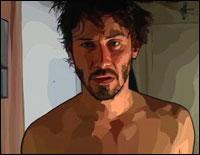 A Scanner Darkly
A Scanner DarklyThere's some question as to why people keep making Phillip K. Dick movies.
They're never faithful to the plot because, well, to be fair it's hard to be. Dick was notoriously abusive to his protagonists. Am I a robot from the future? Or just a schizophrenic lab rat that has been programmed by the government to THINK I'm a robot from the future?
It just seems cruel to make Tom Cruise and Keanu Reeves think at that level. It's much better to go with something like "the guy in the sunglasses wants to stop you from walking through this door...so punch him...a lot."
With "A Scanner Darkly" (aka "My Brain Hurts featuring Keanu Reeves"), Richard Linklater succeeds where others have, well, not even tried really. This is without a doubt the most faithful Dick story committed to film, which is to say that in addition to using the basic premise and the name of the main character, we actually get to see several of the events and even much of the dialog from the book on screen.
Die hard Dickheads will complain that much of the book is missing, and it's true. Linklater made some choices. But let's be frank: at the time Dick wrote this piece he was a hardcore tweaker. Once you establish that someone is tweaking hard, does it really matter if you boil their multi-hundred page paranoid manifestos down just a tad to economize on screen time? Is it all the Word of God?
And we do get most of the A material. The "18-speed bike" and "broken down car" vignettes are worth the price of admission alone. Watching Keanu, Woody and Robert try to work their way through a hedgemaze of paranoid delusions is, well, quite a dark vision.
And speaking of visions, this film is a culmination of several threads for Richard Linklater. Linklater has always been a borderline experimental filmmaker. He's done some mainstream fair, like "School of Rock" and "Before Sunrise," but some of his other efforts seem like incomplete studies, experiments or parts of movies.
In "Tape" he explored clausterphobia, paranoia and rationalization. In "Slacker" he worked with open, plotless dialog-driven character vignettes. In "Waking Life," he first used interpolated rotoscoping.
Each of these films seems to be reaching for something it misses. "Tape" is tight and tense, but ultimately closed off. "Slacker" is fun for a while, but ultimately doesn't connect. "Waking Life" has some interesting moments, but feels unstructured and the rotoscoping becomes less than pointful.
In "A Scanner Darkly," all these elements come together. The tension and paranoia of "Tape" keep your mind on the action even though very little of subtance actually happens for the first hour or so. The rotoscoping that seemed like a cute gimmick in "Waking Life" gives "A Scanner Darkly" the genuine sense of oversaturation and ideal vision that comes from amphetamine abuse. The open-ended rambling of "Slacker" also adds a "genuine tweaker" energy to the dialog, especially in the early parts of the film.
And that's what makes it all work. This feels like real drug users saying and thinking the kinds of things that drug users say and think. The ironic difference (which is part of Dick's genius) is that the paranoid delusions of the main characters are NOT true, but something far more bizarre and sinister IS.
Three stars. Jason Bob sez check it out before it checks you out...unless...THAT'S PART OF THE PLAN!!!

0 Comments:
Post a Comment
<< Home